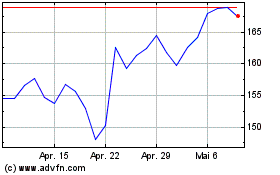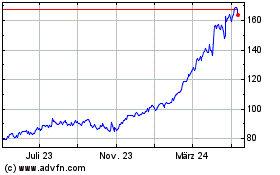GE to Pay $200 Million to Settle SEC Accounting Probe
10 Dezember 2020 - 1:14AM
Dow Jones News
By Dave Michaels and Thomas Gryta
General Electric Co. agreed to pay a $200 million penalty to
settle federal claims that it misled investors by failing to
disclose problems in its gas-turbine power and insurance
businesses, capping an investigation into what went wrong inside
the conglomerate.
The Securities and Exchange Commission, after a multiyear probe
into how GE recognized some costs and profits, said the company
misrepresented how its power business was making money and didn't
inform investors of the rising risk in its legacy insurance
portfolio that would eventually require more than $15 billion to
boost its reserves.
"GE's repeated disclosure failures across multiple businesses
materially misled investors about how it was generating reported
earnings and cash growth as well as latent risks in its insurance
business," said Stephanie Avakian, director of the SEC's Division
of Enforcement.
GE settled the claims without admitting or denying the SEC's
allegations, and the settlement order didn't allege GE violated
U.S. accounting rules or the most serious antifraud laws. Under the
resolution, the company also must report to the SEC for a one-year
period on its policies and controls related to accounting and
disclosure.
GE said no changes to prior financial statements are required.
"We are pleased to have reached an agreement that puts the matter
behind us," the company said. "Under the current leadership team,
we have significantly enhanced our disclosures and internal
controls and are a stronger company today."
The SEC said in announcing the deal that it continues to
investigate the claims, which often means regulators are still
probing whether individuals should be formally accused of
wrongdoing.
The SEC said GE's misconduct spanned from 2015 to 2017 and
involved accounting maneuvers that boosted GE's earnings by
billions of dollars and improved a key measure of its cash flow.
The moves to increase industrial cash flow, by about $1.9 billion
in 2016 and 2017, involved selling receivables, or money GE was
owed from customers, to GE Capital. The company didn't disclose its
increased reliance on selling receivables to goose its industrial
cash flow, the SEC said in the settlement order.
The SEC and the Justice Department have been investigating GE's
accounting for about two years after the company disclosed large
write-downs tied to its insurance business and its power business.
The SEC had warned GE in September that it was preparing civil
charges, and GE said it had set aside $100 million to resolve the
matter.
Accounting problems surfaced in late 2017 as GE was struggling
with declining profits and cash flow following the departure of
former Chief Executive Jeff Immelt. The company later disclosed, in
January 2018, that it needed to bolster its insurance reserves by
$15 billion and booked a $6 billion charge.
GE's stock tumbled in 2017 and 2018, erasing more than $200
billion in market value. The company slashed its dividend to a
token penny a share. It also sold off various business units, cut
jobs and twice switched leaders, installing Larry Culp as CEO in
October 2018. GE also decided to change auditors after more than a
century with KPMG, hiring Deloitte starting in 2021.
Write to Dave Michaels at dave.michaels@wsj.com and Thomas Gryta
at thomas.gryta@wsj.com
(END) Dow Jones Newswires
December 09, 2020 18:59 ET (23:59 GMT)
Copyright (c) 2020 Dow Jones & Company, Inc.
GE Aerospace (NYSE:GE)
Historical Stock Chart
Von Mär 2024 bis Apr 2024

GE Aerospace (NYSE:GE)
Historical Stock Chart
Von Apr 2023 bis Apr 2024
